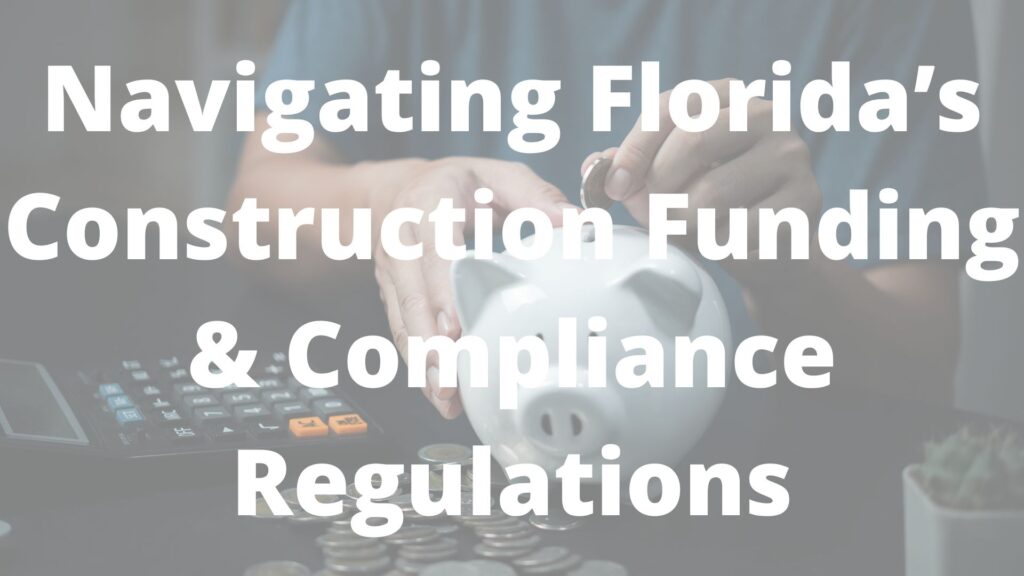
Florida’s construction boom, fueled by population growth and a vibrant economy, presents a unique and intricate landscape for funding and lending. However, this prosperity is intertwined with a complex web of regulatory compliance, demanding meticulous navigation to avoid costly pitfalls. Understanding the interplay of federal and state consumer protection, mitigation banking risks, funding agreement principles, and regulatory terms is paramount for developers, lenders, and contractors alike.
Consumer protection, both at the federal and Florida state levels, plays a crucial role in safeguarding homeowners and buyers. Federal regulations like the Truth in Lending Act (TILA) and the Real Estate Settlement Procedures Act (RESPA) mandate clear disclosures and fair practices in mortgage lending. Florida’s Deceptive and Unfair Trade Practices Act (FDUTPA) further strengthens consumer protections, preventing misleading advertising and unfair contractual terms. These regulations are particularly relevant in the context of construction loans, where transparency regarding interest rates, fees, and project timelines is essential. Failure to comply can lead to substantial fines and legal repercussions, impacting project viability.
Mitigation banking, a critical aspect of Florida’s environmental regulations, introduces another layer of complexity. Developers must often offset the environmental impact of their projects by purchasing credits from mitigation banks, which restore or preserve wetlands and other sensitive habitats. The risks associated with mitigation banking include fluctuating credit prices, regulatory changes, and potential delays in credit availability. Careful due diligence and proactive planning are essential to mitigate these risks and ensure project compliance. Understanding the intricacies of Florida’s environmental resource permitting (ERP) process is crucial for avoiding costly delays and ensuring project sustainability.
Funding and lending agreements in Florida’s construction sector adhere to core principles of contract law, including offer, acceptance, consideration, and legal capacity. These agreements outline the terms of financing, including loan amounts, interest rates, repayment schedules, and collateral requirements. Lenders must conduct thorough due diligence to assess the borrower’s creditworthiness and project feasibility. Construction loan agreements often include disbursement schedules tied to project milestones, ensuring that funds are released progressively as work is completed. These agreements also address contingencies, such as cost overruns and project delays, and outline remedies for breach of contract.
General state and federal regulatory terms governing construction in Florida encompass a wide range of areas, including building codes, environmental regulations, labor laws, and licensing requirements. The Florida Building Code (FBC) sets minimum standards for construction safety and durability, while the Florida Department of Environmental Protection (FDEP) enforces regulations related to water quality, wetlands protection, and stormwater management. Federal regulations, such as the Occupational Safety and Health Act (OSHA), ensure workplace safety, and the Fair Labor Standards Act (FLSA) governs minimum wage and overtime requirements. Compliance with these regulations is essential for obtaining permits, avoiding fines, and maintaining a positive reputation. Navigating this intricate web requires a deep understanding of both federal and state laws, proactive planning, and meticulous documentation.
 John Caravella Esq., is a construction attorney and formerly practicing project architect at The Law Office of John Caravella, P.C., representing architects, engineers, contractors, subcontractors, and owners in all phases of contract preparation, litigation, and arbitration across New York and Florida. He also serves as an arbitrator to the American Arbitration Association Construction Industry Panel. Mr. Caravella can be reached by email: [email protected] or (631) 608-1346.
John Caravella Esq., is a construction attorney and formerly practicing project architect at The Law Office of John Caravella, P.C., representing architects, engineers, contractors, subcontractors, and owners in all phases of contract preparation, litigation, and arbitration across New York and Florida. He also serves as an arbitrator to the American Arbitration Association Construction Industry Panel. Mr. Caravella can be reached by email: [email protected] or (631) 608-1346.
The information provided on this website does not, and is not intended to, constitute legal advice; instead, all information, content, and materials available on this site are for general informational purposes only. Readers of this website should contact their attorney to obtain advice with respect to any particular legal matter. No reader, user, or browser of this site should act or refrain from acting on the basis of information on this site without first seeking legal advice from counsel in the relevant jurisdiction. Only your individual attorney can provide assurances that the information contained herein – and your interpretation of it – is applicable or appropriate to your particular situation. Use of, and access to, this website or any of the links or resources contained within the site do not create an attorney-client relationship between the reader, user, or browser and website authors, contributors, contributing law firms, or committee members and their respective employers.
References:
- Florida Department of Environmental Protection (FDEP). (n.d.). Environmental Resource Permitting. Retrieved from https://floridadep.gov/water/water/content/environmental-resource-permitting
- Florida Department of Agriculture and Consumer Services (FDACS). (n.d.). Florida Deceptive and Unfair Trade Practices Act. Retrieved from https://www.fdacs.gov/ConsumerResources/Protecting-Your-Home/Contractors-and-Construction/Florida-Deceptive-and-Unfair-Trade-Practices-Act
- Consumer Financial Protection Bureau (CFPB). (n.d.). Truth in Lending Act (TILA). Retrieved from https://www.consumerfinance.gov/rules-policy/regulations/1026/
- Consumer Financial Protection Bureau (CFPB). (n.d.). Real Estate Settlement Procedures Act (RESPA). Retrieved from https://www.consumerfinance.gov/rules-policy/regulations/1024/
- Florida Building Code (FBC). (n.d.). Retrieved from https://www.floridabuilding.org/
